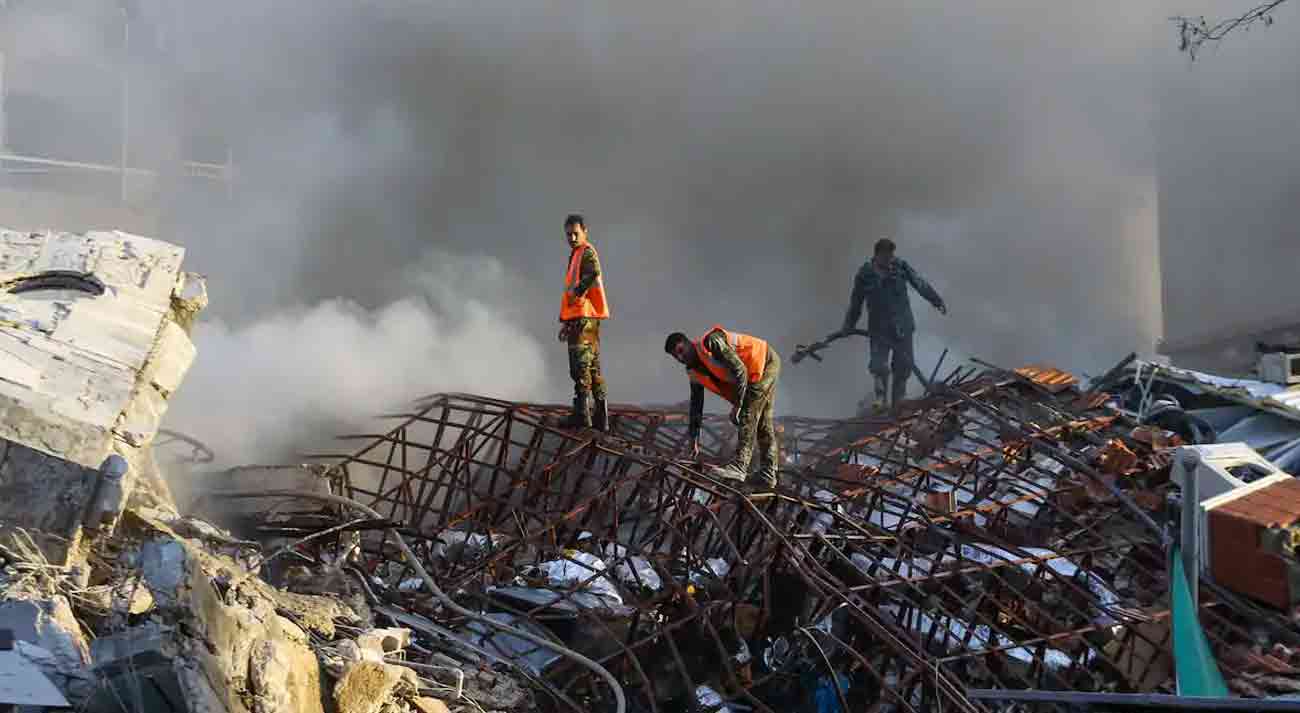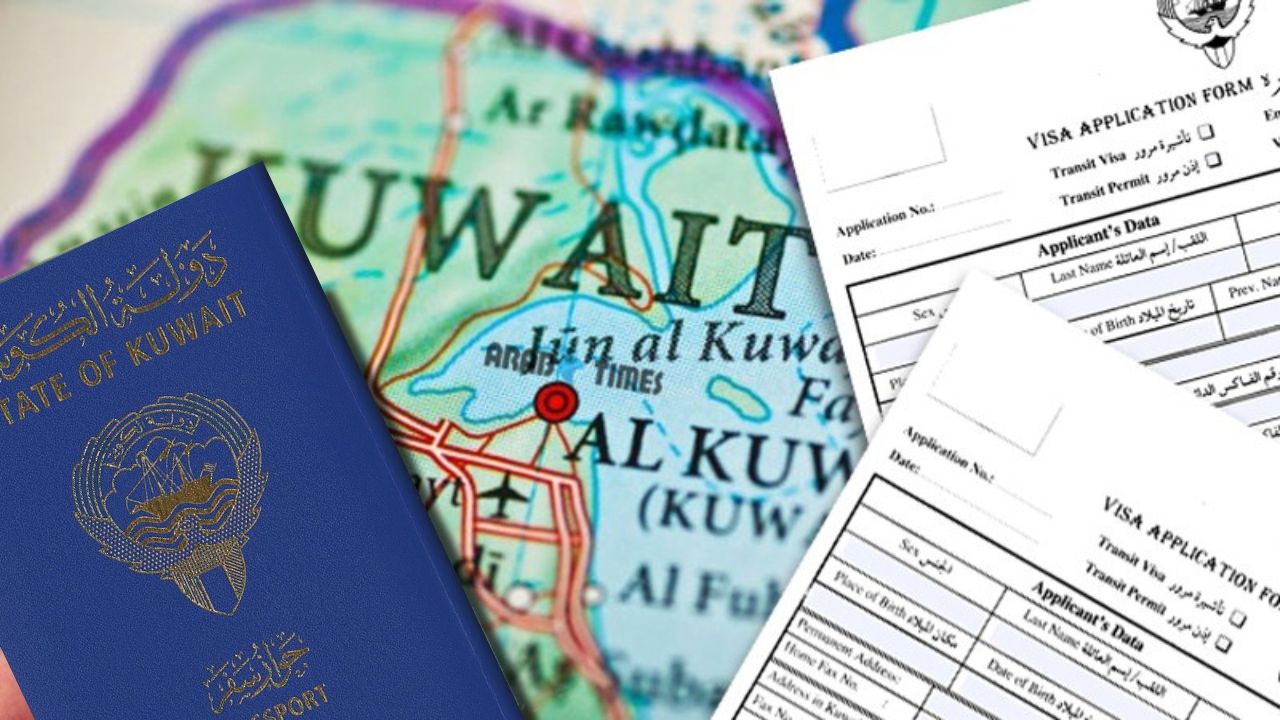
The airstrike destroyed the consulate building in the capital Damascus, killing at least seven officials including Mohammed Reza Zahedi, a top commander in Iran’s elite Revolutionary Guards (IRGC), and senior commander Mohammad Hadi Haji Rahimi, according to Iran’s Foreign Ministry.
At least 6 Syrian citizens were also killed, Iranian state television reported on Tuesday.
Zahedi, a former commander of the IRGC’s ground forces, air force, and the deputy commander of its operations, is the most high-profile Iranian target killed since then-US President Donald Trump ordered the assassination of IRGC Gen. Qassem Soleimani in Baghdad in 2020.
Emergency and security personnel gather at the site of strikes which hit a building next to the Iranian embassy in Syria's capital Damascus, on April 1, 2024. Syrian state media said Israeli strikes hit an Iranian consulate annex in the capital on April 1, while a war monitor reported eight people were killed and Iranian state media said a senior commander of the powerful Islamic Revolutionary Guard Corps was among the dead, amid rising regional tensions due to the Gaza war. (Photo by Maher AL MOUNES / AFP) (Photo by MAHER AL MOUNES/AFP via Getty Images)
Iran and Syria accused Israel of authoring the attack, with Tehran warning of a “serious response,” and the powerful Iran-backed Lebanese militant group Hezbollah saying the strike will be met with “punishment and revenge.” Iran also said it would hold the United States “answerable” due to its support of Israel.
Iran Supreme Leader Ayatollah Ali Khamenei said Israel would be punished for the attack, while President Ebrahim Raisi said it will “not go unanswered,” state news agency IRNA reported.
The Israeli military told CNN it does not comment on foreign reports. However, a military spokesperson said Israel believes the target struck was a “military building of Quds forces” — a unit of the IRGC responsible for foreign operations.
“According to our intelligence, this is no consulate and this is no embassy,” Israel Defense Forces spokesperson Rear Adm. Daniel Hagari told CNN. “I repeat, this is no consulate and this is no embassy. This is a military building of Quds forces disguised as a civilian building in Damascus.”
Four unnamed Israeli officials acknowledged that Israel carried out the attack, the New York Times reported.
CNN cannot verify the Times’ report, nor independently verify the claims from Iran, Syria and Israel.
The United States considers its own embassies and consulates abroad, as well as foreign countries’ embassies and consulates in the US to have a special status. According to the US State Department, “an attack on an embassy is considered an attack on the country it represents.”
A spokesperson for the White House National Security Council said the United States was not involved in the strike and did not know about it ahead of time. A US official said that information was “directly” relayed to Tehran.
Israel has intensified its military campaign against Iran and its regional proxies following the October 7 attack on Israel by Tehran-backed Palestinian group Hamas, which killed about 1,200 people and saw more than 200 taken hostage.
Israel’s subsequent war in Gaza has killed more than 32,800 people, according to the Ministry of Health in the besieged enclave, wrought widespread destruction and brought more than 1 million people to the brink of a man-made famine.
While Israel has long targeted Iran and its proxies in Syria, its latest apparent attack in Damascus is a significant escalation due to both the location and the target. The consulate building, which includes the ambassador’s residence and is located next to the Iranian Embassy, is considered sovereign Iranian territory.
Protesters gathered across Tehran to vent their anger and burn Israeli and American flags.
“This is perhaps the first time that the Zionist regime allows itself to attack an official building of the Islamic Republic of Iran embassy, which had the flag of the Islamic Republic raised on top of it,” said Iran’s ambassador to Syria Hossein Akbari.
Palestinians inspect the damages at the area around Al Shifa Hospital following a two-week Israeli operation, amid the ongoing conflict between Israel and Hamas, in Gaza City April 1, 2024. REUTERS/Dawoud Abu Alkas
Iranian Foreign Ministry spokesperson Nasser Kanaani warned that Tehran “preserves the right to take reciprocal measures and will decide the type of response and punishment against the aggressor.”
And the country’s Foreign Minister Hossein Amir-Abdollahian called the attack a “violation of all international obligations and conventions” that demanded a “serious response” from the international community.
Amir-Abdollahian also held the United States responsible given its support for Israel, underscoring the increasing strain between Tehran and Washington.
“The United States should be answerable,” Iran’s top diplomat said in a post on X.
Tehran summoned the Swiss chargé d’affaires in the early hours of Tuesday local time to discuss the incident, Amir-Abdollahian added. Switzerland represents US interests in Iran.
“The dimensions of the Israeli regime’s terrorist attack and crime were explained, and the American administration’s responsibility underlined,” Amir-Abdollahian said.
Syrian Foreign Minister Faisal Mekdad meanwhile described the strike as a “gross violation of international regulations, especially the 1961 Vienna Convention on Diplomatic Relations.”
UN Secretary General Antonio Guterres called on all sides to exercise restraint and warned that any miscalculation could to a broader conflict with “devastating consequences,” said his spokesman, Stephane Dujarric.
“We may see an increase or a resumption of attacks by Iraqi militias and Syrian militias against US troops. And that would mean that the Israeli attack on Iran actually puts a target on the backs of American troops in the Middle East,” Trita Parsi, executive vice president at the Quincy Institute for Responsible Statecraft, told CNN.




